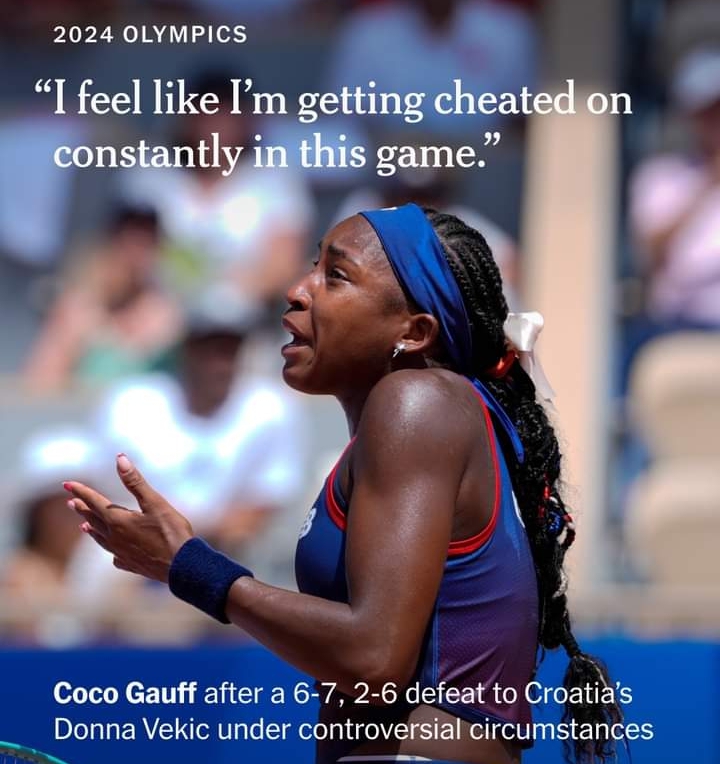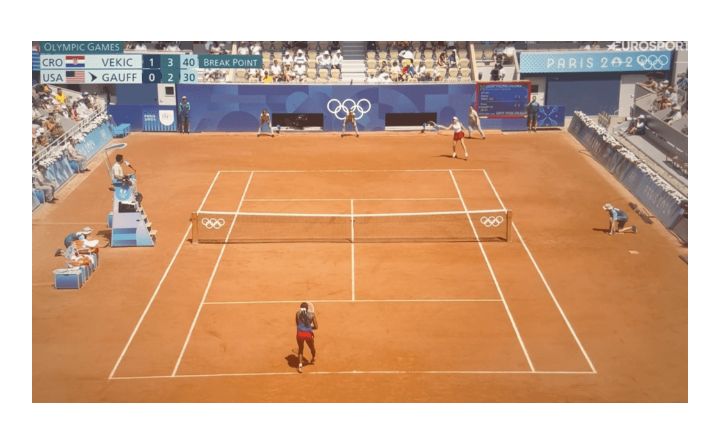CELEBRITIES
American No. 1 Coco Gauff lost to Croatia’s Donna Vekic in the Olympic women’s singles tournament, but the tennis match was overshadowed by a controversial line call decision. Gauff broke down in tears, saying “it always happens to me on this court.”

American No. 1 Coco Gauff lost to Croatia’s Donna Vekic in the Olympic women’s singles tournament, but the tennis match was overshadowed by a controversial line call decision. Gauff broke down in tears, saying “it always happens to me on this court.”
Coco Gauff of the United States lost 6-7, 2-6 to Croatia’s Donna Vekic in the Olympic women’s singles tournament, but the match was overshadowed by a controversial line call decision in the second set as Gauff was trying to stage a comeback.
The dispute led to an argument of several minutes during which Gauff said repeatedly that the point should have been replayed. “You have to understand this is not fair,” she said on the court before the match resumed.
Here’s what happened, the rules surrounding the incident, and why Gauff was so frustrated by the official decision.
At 2-3, 30-40, Vekic returned a second serve from Gauff.
She caught the ball slightly off-center, causing it to loop back deep into the center of the court, pushing Gauff back behind the baseline. Gauff set up in her full forehand ready position, able to prepare fully because of the
As the ball bounced, extremely close to the line, a linesperson called Vekic’s shot out as Gauff swung into the forehand speed of the ball.
Gauff then pulled up on her follow-through, sending the ball into the net.
Immediately after the call, the linesperson said “correction,” which is the word umpires use to overrule a call. This meant he judged the ball from Vekic to be in, and chair umpire Jaume Campistol awarded her the point because Gauff’s follow-up shot had gone into the net. The point gave Vekic a break of serve at a decisive time in the match.
The ITF (International Tennis Federation) rules govern the Olympic tennis tournaments.
Regarding the overruling of line calls, Case 7 is as follows:
“If a chair umpire or line umpire calls ‘Out’ and then corrects the call to good, what is the correct decision?
“Decision: The chair umpire must decide if the original ‘Out’ call was a hindrance to either player. If it was a hindrance, the point shall be replayed. If it was not a hindrance, the player who hit the ball wins the point.”
The rule puts chair umpires in an impossible – and completely avoidable – position.
Why impossible?
Because umpires have to go inside the mind of a player and decide whether the out call hindered the swing of the player. In almost all cases, the answer would figure to be yes, since calls are made as soon as the ball bounces and generally before the racket makes contact with a ball. It’s generally accepted that a loud yell while, or even before a player is hitting a ball is a disruption. It’s why umpires are constantly saying “quiet please.”
Gauff argued about whether the call came before she hit the ball. Audio of the incident suggests that it did come after her shot. Yet according to the rule, that doesn’t even matter. The issue is whether the call, whenever it came, disrupted her — whether it was a “hindrance,” the rulebook says.
She said it caused her to pull up on her swing. The umpire said it did not.
So why was this avoidable?
Video line calls happen throughout top-level tennis. The technology has been around for more than a decade. It became very widespread during the Covid-19 pandemic, when tennis wanted to limit the number of people close to the players. A computer never gets overruled, and does not incorrectly call a ball out in the middle of a player’s backswing.
What did Coco Gauff say about it?
Immediately following the overrule from the chair umpire, Gauff said “(the linesperson) called it out before I hit it, so I went up on the ball.” Pulling out of a full follow-through on her forehand, as she did, contributes to the trajectory of the shot. Gauff described the differences between the shots, motioning a full swing and an abbreviated swing to make her case.
She then broke down in tears, saying “it always happens to me on this court.” She was referring to a previous, similar incident against Iga Swiatek in the semifinal of this year’s French Open. “It always happens to me at French Opens, every time,” she said. “I always have to advocate for myself on this court, all the time.”
“I feel like I’m getting cheated on constantly in this game,” she added when speaking to tournament supervisor Clare Wood. “It happens to me, it happened to Serena,” referring to Serena Williams, who felt that umpire Carlos Ramos “stole” points from her during a U.S. Open final against Naomi Osaka in 2018, and was subjected to a litany of completely incorrect line calls in a match against Jennifer Capriati at the US Open in 2004. The calls during that 2004 match prompted an apology from the United States Tennis Association (USTA) and partly led to the introduction of Hawk-Eye video calls, which at the time were only used for TV viewers.
Before returning to the court to serve down 2-4, Gauff said: “It’s not fair at all. You guys are not fair to me and I hope one day that the game becomes fair but it’s not.”
A tearful Gauff approached chair umpire Aurelie Tourte, and during their exchange said that the crowd was “booing because they know (she) is wrong.”
After the match, Gauff advocated for the use of video replays: “I definitely think at this point it’s almost ridiculous that we don’t have it. Not just because that happened to me, but every sport has it.
“There are so many decisions that are made, and it sucks as a player to go back or online and you see that you were completely right, and it’s, like, what does that give you in that moment?












